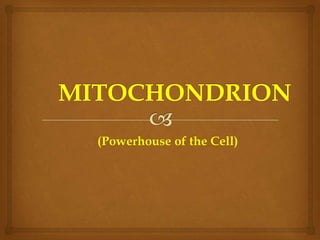
Mitochondria
- 1. (Powerhouse of the Cell)
- 2. Mitochondria (singular, mitochondrion) – are typically tubular or rod-shaped organelles found in the cytoplasm of most cells and produces enzymes for the metabolic conversion of food to energy. Mitochondria are responsible for converting nutrients into the energy-yielding molecule adenosine triphosphate (ATP) to fuel the cell's activities. This function, known as aerobic respiration, is the reason mitochondria are frequently referred to as the powerhouse of the cell.
- 3. FUNCTION
- 4. Energy conversion The most prominent roles of mitochondria are to produce the energy currency of the cell, ATP, through respiration, and to regulate cellular metabolism. A dominant role for the mitochondria is the production of ATP, as reflected by the large number of proteins in the inner membrane for this task.
- 5. A mitochondrion contains outer and inner membranes composed of phospholipid bilayers and proteins. The two membranes have different properties. Because of this double-membrane organization, there are five distinct parts to a mitochondrion. They are:
- 6. - encloses the entire organelle, has a protein-to- phospholipid ratio similar to that of the eukaryotic plasma membrane
- 7. Outer membrane contains large numbers of integral proteins called porins. allow molecules to freely diffuse from one side of the membrane to the other.
- 8. - is the space between the outer membrane and the inner membrane
- 9. Intermembrane space It is also known as Perimitochondrial space. Because the outer membrane is freely permeable to small molecules, the concentrations of small molecules such as ions and sugars in the intermembrane space is the same as the cytosol.
- 10. - also double phospholipid layer - it is the site of the production of ATP
- 11. Inner membrane FUNCTIONS: Those that perform the redox reactions of oxidative phosphorylation Specific transport proteins that regulate metabolite passage into and out of the matrix Protein import machinery Mitochondria fusion and fission protein
- 12. - The folding of the inner membrane that allows more surface area, enhancing its ability to produce ATP.
- 13. - Fluid material that fills the area inside the inner membrane
- 14. Matrix The matrix is the space enclosed by the inner membrane. It contains about 2/3 of the total protein in a mitochondrion. The matrix is important in the production of ATP with the aid of the ATP synthase contained in the inner membrane.
